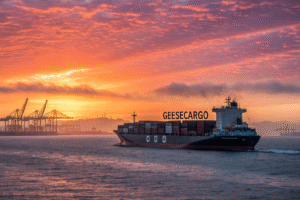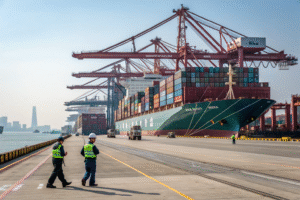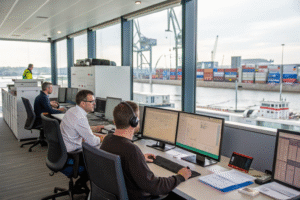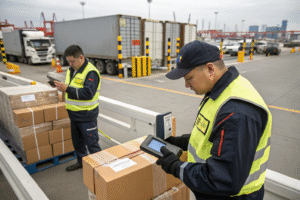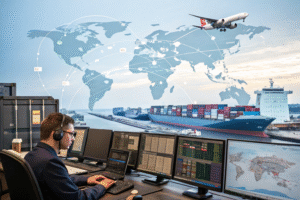If you’ve ever tried to book international freight on your own, you probably noticed this: prices are all over the place. Some are sky-high. Others are unclear. And unless you ship huge volumes, your bargaining power is limited.
Freight forwarders can negotiate better shipping rates by pooling client volumes, maintaining long-term carrier relationships, and accessing wholesale contracts unavailable to individual importers.
When you work with the right forwarder, you're not just buying shipping — you’re buying scale, leverage, and logistics strategy.
How freight forwarders leverage volume discounts
Carriers prioritize clients who fill their containers and flights. That’s why forwarders — who combine cargo from many clients — get access to lower base rates and special space agreements.
Freight forwarders secure volume-based discounts by booking hundreds or thousands of containers annually, giving them stronger rate negotiation power than small or mid-sized shippers.

Why do forwarders get better pricing?
| Reason | Impact |
|---|---|
| Aggregated Volume | Combines many small shipments into FCL contracts |
| Weekly Bookings | Guarantees carriers consistent business |
| Contractual Commitments | Allows forwarders to lock in peak season space |
| Risk Absorption | Forwarders take on penalties and rerouting if needed |
At GeeseCargo, we move thousands of CBMs monthly from China to the U.S. and EU. This lets us offer rates that individual importers cannot access alone, especially on high-demand lanes like Ningbo → LA or Shenzhen → NY.
Does this apply to air freight too?
Yes. Airlines also reward high-volume forwarders with:
- Space priority during flight shortages
- Lower rates for deferred or scheduled air lanes
- Access to express space blocks during peak seasons
Even if your shipment is small, you benefit from big-shipper economics when you ship through a volume-forwarder.
Benefits of forwarder-carrier relationships for pricing
Pricing isn’t just about quantity — it’s about trust. Long-standing relationships between forwarders and carriers lead to flexibility, preferred space, and stable rates.
Forwarders with strong carrier relationships can secure better pricing, faster booking confirmations, and reduced penalties when rerouting is required.

What advantages do these relationships provide?
| Advantage | Result |
|---|---|
| Priority booking access | Easier FCL space even during peak demand |
| Lower GRI impact | Forwarders can push back on General Rate Increases |
| Custom rate negotiations | Flexible pricing based on trade lane forecasts |
| Reduced roll risk | Containers less likely to be bumped from vessel |
| Faster carrier response | Rate and schedule questions answered quickly |
For example, during 2024’s Q4 shipping crunch, we secured stable FCL pricing for our DDP clients while the spot market jumped 35%. This was possible due to our annual contract volume with two of the top-5 shipping lines.
Can relationships help in problem resolution?
Absolutely. In case of:
- Vessel delays
- Port congestion
- Container rerouting
- Dispute over demurrage
A forwarder with real carrier leverage can escalate, escalate again — and get results. Independent shippers usually get a generic email or long delays.
When to rely on forwarders for rate negotiations
It may seem like booking directly with a carrier or 3PL is faster. But unless you ship daily, you’re likely to overpay — or miss hidden surcharges.
You should rely on freight forwarders for rate negotiation when your volume is under 500 TEUs annually, your routes vary, or you want DDP or full-service logistics.

Who benefits most from forwarder-negotiated rates?
| Shipper Type | Why Forwarders Help |
|---|---|
| Small/medium importers | No scale to secure direct discounts |
| First-time buyers | Avoids beginner pricing mistakes |
| Multi-supplier shipments | Forwarder consolidates for cheaper FCL or LCL |
| DDP shippers | Forwarders bundle freight, tax, customs, and delivery |
| eCommerce brands | Need flexibility in volume, method, and destination |
One of our U.S. clients tried to book air freight direct for a 200 kg shipment. They were quoted $8.50/kg. We booked the same route for $5.60/kg — saving them $580 on one shipment alone.
When might direct booking make sense?
- You ship daily, same lane, same Incoterms
- You have a customs compliance team in-house
- You’ve signed long-term contracts with carriers
But even in these cases, many large businesses still use forwarders — for flexibility and backup space access.
Comparing direct shipping quotes vs. forwarder rates
Direct shipping quotes may appear lower — but once you add documentation, customs, handling, and last-mile fees, the total often exceeds what a forwarder offers all-in.
Freight forwarder rates are typically more transparent and inclusive — reducing surprise fees and allowing better landed cost planning.

Let’s compare two real-world examples:
Scenario: 4 CBM shipment from Ningbo to New Jersey
| Cost Component | Direct Carrier | GeeseCargo |
|---|---|---|
| Base Freight | $380 | $460 |
| Export Handling | $90 | Included |
| Customs Filing | $85 | Included |
| ISF / AMS Fee | $45 | Included |
| Destination Handling | $130 | Included |
| Truck Delivery | $250 | Included |
| DDP Taxes | Not Available | Included |
| Total | $980+ | $460 all-in |
In this case, the direct quote seemed cheaper — until all extras were added. Our quote was not only lower, but also included door delivery, duty coverage, and proactive tracking.
What should you ask when comparing quotes?
- Is this door-to-door or port-to-port?
- Are customs fees included?
- Does it cover fuel, BAF, EBS, and ISF filing?
- Are there minimum CBM or weight charges?
At GeeseCargo, every quote is line-item transparent, so you know exactly what you’re paying — before you ship.
Conclusion
Freight forwarders are more than middlemen — they’re negotiators, consolidators, and risk managers. With access to better rates through volume and relationships, they help businesses of every size reduce shipping costs and improve predictability. With GeeseCargo, you're not just shipping — you're shipping smarter.

